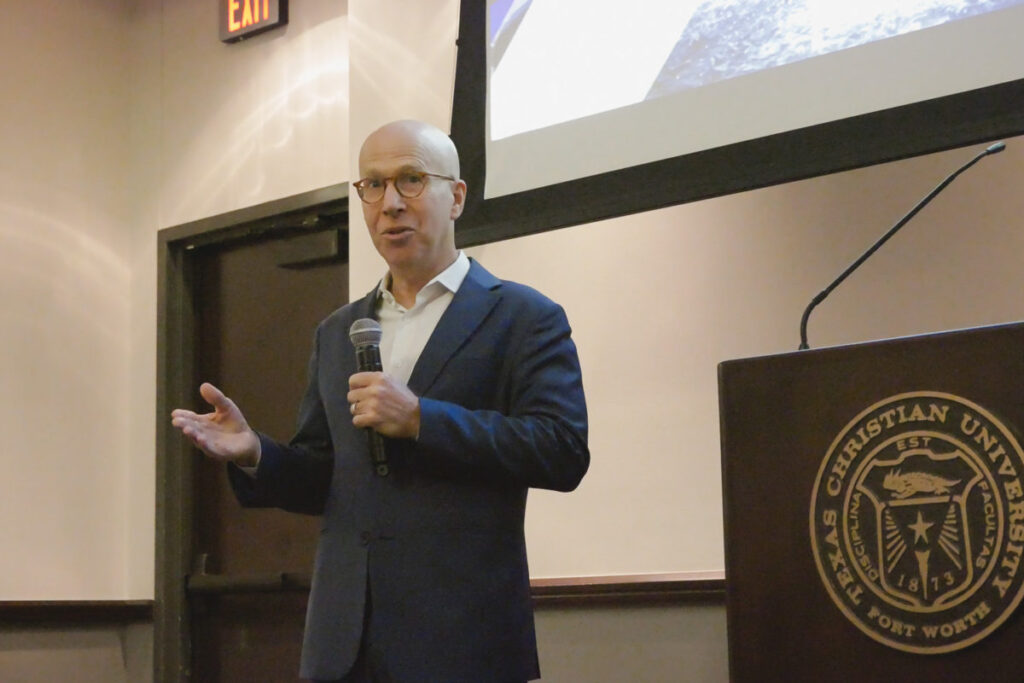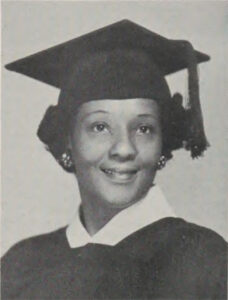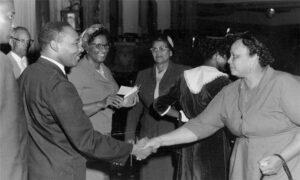
Jonathan Eig, a former senior writer for The Wall Street Journal and the author of “King: A Life,” speaks at TCU’s “Reconstructing King: An Evening with Jonathan Eig” on September 19, 2023. (Thai Pham/TCU 360 Staff Photographer)
Schieffer College’s Green Honors Chair, Johnathan Eig, helped bring the story of Dr. Martin Luther King Jr. to TCU’s campus 64 years after the university declined to host Dr. King. Eig spoke with Bob Ray Sanders, Fort Worth journalist, about his newest biography, “King: A Life.” This monumental biography debuted at No. 7 on The New York Times Bestseller List and made President Barack Obama’s 2023 summer reading list.
Gathered in the Dee J. Kelly Alumni and Visitors Center, Eig offered little-known facts to the crowd of students, faculty, staff and community members, such as that Dr. King’s name was not originally Martin or Luther. He was initially Mike Lucius King. For his book, Eig was given an inside view of the good, bad and ugly of Dr. King’s life through the experiences of those around him. At one point, Sanders and Eig discussed Dr. King’s foibles: the icon plagiarized speeches; he didn’t believe women should be in leadership positions; he cheated on his wife. The conversation focused on the dichotomy of humanity, and how the concepts of good and bad are often more complicated.
Vada Felder: the Real “Super Frog”

Vada Felder ’54
Dean Kristie Bunton began the evening by acknowledging Dr. King’s almost-visit and the woman who made it possible, Vada Felder ’54, the first African American to graduate from Brite Divinity School. Felder later became president of the United Christian Leadership School, which provided religious training for lay leaders of Black churches.
“Vada Felder died in 2008,” Bunton told the crowd. “The example she set in 1959 shows me she was a person of conviction and courage, and I wish I had met her. I am sorry that TCU did not host Dr. King in the fall of 1959. But I am glad that this evening, we can recognize the errors of our past and draw encouragement for our present.”
In an interview with TCU360, Mason Wagner ’18, author of the research paper “Vada Felder: the Real’ Super-Frog,” said, “For all intents and purposes, it is reasonable to say without her, Martin Luther King Jr. may have never visited the metroplex, or the state of Texas at all.”
A Stop On the Path to Equal Rights
In the summer of 1959, Felder traveled to Nashville, Tennessee, for a Baptist meeting, where she met Dr. King and invited him to Fort Worth to speak. He agreed to visit in the fall. However, Brite and TCU decided not to host Dr. King, and local hotels would not house him.

Dr. King’s visit to Fort Worth
Undeterred, Felder invited Dr. King to stay in the home she shared with her mother and arranged for him to give his lecture in downtown Fort Worth at the Majestic Theatre. Around 400 people paid $1.25 each to hear Dr. King speak about what he called “the struggle to save the soul of America.” The Fort Worth Star-Telegram noted that it was the first time many of the 400 attendees had ever walked in the front door or sat on the main level of the previously segregated theater.
“His visit gave us courage,” Felder told Star-Telegram columnist Bud Kennedy in 2002. “He taught us that we could stand up and do what was right — and do it in peace. He came and went from Fort Worth in peace.”
Dr. Kings’s visit to Fort Worth is fondly remembered. Less than a year after his visit, TCU desegregated. However, Dr. King would not return to Fort Worth again before his death eight years later. With the Eig and Sanders event, TCU finally got to say yes to bringing Dr. King to campus.
The Cecil H. and Ida Green Honors Chair program brings scholars and artists of national and international stature to campus for short residencies to promote new ideas and community collaboration.
